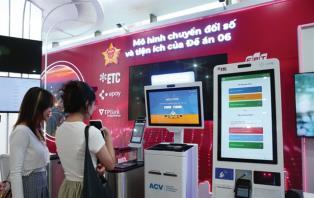Under the plan, all business households nationwide will switch to a self-declaration and payment, starting from January 1, 2026, putting an end to lump-sum tax mechanism that has been in place for decades.

Compiled by Mai Linh
HÀ NỘI — The Ministry of Finance has approved a comprehensive plan to abolish the long-standing lump-sum tax regime for business households, aiming to modernise tax administration and create a fairer business environment.
Under the plan, all business households nationwide will shift to a self-declaration and payment system from January 1, 2026, marking the end of a mechanism that has been in place for decades.
The plan seeks to simplify administrative procedures, accelerate digital transformation and cut compliance costs by at least 30 per cent, promoting the growth of the private sector, according to the ministry. Its goal is to establish a modern, transparent and equitable tax system that puts taxpayers at the centre of reform.
To achieve this, the Ministry of Finance will focus on overhauling legal frameworks and policies to ensure consistency and timely implementation. It will propose amendments to the Law on Tax Management and related documents to formally abolish the lump-sum tax on business households.
Policies on personal income tax and value-added tax will also be revised to redefine taxable thresholds and calculation methods for business households operating at a scale similar to small and medium-sized enterprises (SMEs).
For households maintaining proper accounting records, personal income tax will be calculated on net income to encourage transparency and fair competition.
The ministry also plans to revise the laws on fees and charges and on supporting SMEs, alongside proposing a new separate law on individual business.
The tax authority will expand the use of digital tools – including AI-powered chatbots and automated e-filing systems – to support taxpayers, simplify declaration forms and reduce errors.
Supervision will be strengthened through risk-based management and electronic invoice tracking to combat fraud, invoice trading and tax evasion.
All household businesses using e-invoices generated from cash registers, as required under Decree 70/2025, must complete registration before the new model takes effect.
“The reforms are not meant to impose new burdens but to support business households,” said Deputy Director of the General Department of Taxation Mai Sơn.
He added that tax authorities were simplifying procedures, cutting compliance costs and partnering with technology firms to make the transition easier.

65% exempted
Under the plan, business households are divided into three groups based on their annual revenue, each with specific tax obligations.
The first group includes households with annual revenue under VNĐ200 million (US$8,000). They will be exempt from both value added tax (VAT) and personal income tax (PIT). The threshold is double the previous level, providing relief to millions of small family-run shops and traders, estimated to account for more than 65 per cent of all business households. However, they must declare twice per year.
The second group includes those with revenue between VNĐ200 million and under VNĐ3 billion per year.
For VAT, Group 2 will pay following the direct method or may voluntarily register for the deduction method if they meet the qualifying conditions. PIT will also be based on a percentage of revenue depending on the type of activity.
The tax rates will vary depending on their business sector, such as 1.5 per cent for distribution and trading, 4.5 per cent for manufacturing and food services, 7 per cent for other services and 10 per cent for property leasing.
Group 2 will be required to maintain simplified accounting books under standardised templates and file tax declarations quarterly, or four times per year.
A key change under the new regime requires all household businesses with annual revenue above VNĐ1 billion and operating in retail or direct consumer services to issue e-invoices generated from cash registers connected to tax authorities.
They will be required to open separate bank accounts for business transactions. If a household’s annual revenue exceeds VNĐ3 billion for two consecutive years, it will be reclassified into Group 3.
Group 3, with annual revenue exceeding VNĐ3 billion, will be treated similarly to small enterprises, requiring them to adopt the VAT deduction method.
Group 3 will be subject to a PIT rate of 17 per cent of profit. Businesses earning over VNĐ50 billion per year must declare tax monthly, while quarterly reporting is required for the rest.
Issuance of invoices is compulsory for Group 3 and they must open separate bank accounts for their businesses.
The ministry said the Government encourages Group 3 to convert into enterprise models to enjoy additional incentives under Resolution 68-NQ/TW on private sector development and Resolution 198/2025/QH15 on special mechanisms and policies for private economic growth.
For individuals doing business on e-commerce platforms, if the platform has a payment function, it will withhold, declare and pay VAT and PIT on behalf of the seller, calculated as a percentage of revenue. If the individual’s annual revenue is below VNĐ200 million, any excess tax paid will be refunded.
If the platform does not have a payment function, the individual must declare and pay taxes on their own.
Experts say the move will close long-standing loopholes that allowed large traders to disguise themselves as household businesses to enjoy lump-sum tax benefits and evade taxes.
“It’s a transition period for small traders and household businesses to prepare and familiarise themselves with tax declaration and payment,” said Nguyễn Văn Được, general director of Trọng Tín Accounting and Tax Consulting Company Limited.
Statistics from the Ministry of Finance showed that by the end of 2024, there were about 3.6 million household and individual businesses in Việt Nam, up 6 per cent from 2023.
As of the first seven months of 2025, out of 2.35 million active household businesses, about 65.7 per cent, equivalent to 1.5 million, earned less than VNĐ200 million per year in revenue. This group paid a total of VNĐ2.41 trillion in taxes during the period.
About 791,000 households, or 33.6 per cent of the total, earned between VNĐ200 million and under VNĐ3 billion. This group contributed VNĐ7.886 trillion in tax.
About 12,000 households earned between VNĐ3 billion and VNĐ50 billion, contributing VNĐ1.032 trillion in tax, while 1,464 households reported annual revenue above VNĐ50 billion and paid VNĐ288 billion in taxes.
In the first nine months of 2025, more than 18,500 lump-sum taxpayers shifted to the declaration method, while nearly 2,530 households upgraded to enterprise status. — VNS





